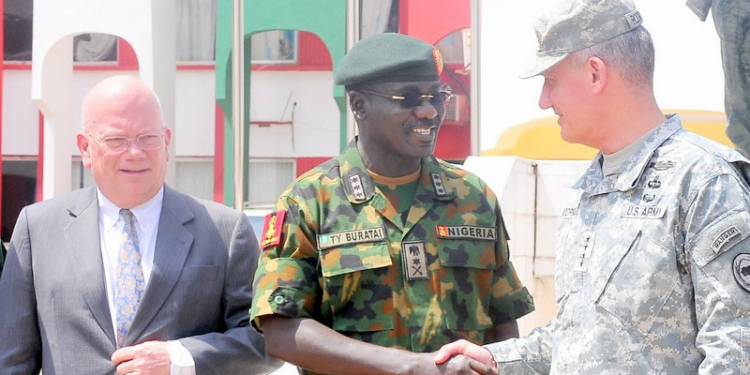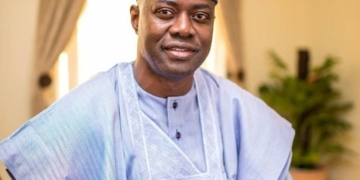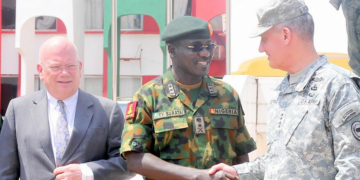Two American generals have been celebrated over the years for their gallantry and superior strategies at the battlefield.
The first is General George Patton, an intellectual soldier, who is known for studying the strategies adopted by his predecessors, recruiting the best experts he could find to analyse and process them and using their advice to formulate and deliver his winning strategy.
The other is General Colin Powell, under whose leadership, the US Army and other allied forces marched to the Gulf for ‘Operation Desert Storm.’
Powell won the 2006 Truman Peace Prize for his efforts on “war against terrorism,” and is known for prosecuting wars through diplomatic as well as military means while averting regional and civil conflicts.
A keen observation of the efforts of the Nigerian Army under the leadership of the Chief of Army Staff, Lt. General Tukur Yusufu Buratai, would reveal a great understanding of these two war generals.
Upon assuming duty as the Chief of Army Staff in 2015, General Buratai brought systemic coordination on the war against terrorism and insurgency in Nigeria.
Since the Boko Haram terrorists took up arms against the Nigerian state in 2009, various military approaches have been deployed to defeat the sect. President Umaru Yar’Adua in his initial reaction went for the military option and ordered a crackdown on the activities of the sect.
The strategy worked in one aspect but failed in another. The purely military intervention saw to the elimination of the Boko Haram foot soldiers and the arrest of their spiritual leader but did not put in place measures that will make it difficult for the sect to reorganize and stage a comeback which was what they did after about two years in the cooler. That gap only further hardened the remnants of the sect who regrouped and continued their heinous activities with more aggression and under a new leadership.
When then President Goodluck Jonathan succeeded Yar’dua, the approach changed as he concentrated mainly on the diplomatic approach by trying to bring the terrorists to a round table but the overtures were severally rebuffed by the terrorists.
The reluctance to take on the terrorists and the focus on dialogue gave the insurgents the impression that the Nigerian government was weak and enabled them to recruit in large numbers and carry out attacks with more ferocity.
During this time, banks in major towns and cities were raided, communication installation were vandalized, security posts overran, barracks subdued and weaponries invaded and emptied by the terrorists.
It was an all time low for Nigeria as Nigerian troops sent to confront the sect members fled to neighboring countries for safety and many were declared AWOL due to the high number of casualty.
It was when President Muhammadu Buhari appointed Buratai as the chief of Army Staff that the story began to change.
On assuming office in June 2015, General Buratai used the first trimester to study the strategies adopted in the past by his predecessors and this enabled him to understand where the mistakes lay.
The observations he made gave the Nigerian troops a good understanding of the enemy, the terrain they operate, why past tactics failed and galvanized them into understanding why the war is winnable with a different strategy.
He also brought to bear the experience of world renowned generals and in no time, the Federal Government of Nigeria became very confident that it set a December 2015 target for the defeat of Boko Haram.
The tempo which the order was carried out made the Federal Government to gleefully announce the technical defeat of the Boko Haram terrorists. This was unprecedented as the base of the terrorists was terribly weakened and the dreaded base of their operation, Sambisa Forest, was laid bare for all to see.
Military and security experts who were quick to see a novel strategy that did not only confounds the enemy but obliterates the possibility of resurgence while avoiding civilian casualties at work, tried in vain to explain the phenomena.
Other nations who were giving up on Nigeria began to look its way and became interested in knowing the formula with which Nigeria was beginning to turn things around.
It was later that it struck a chord that Buratai must have combined the Patton finesse for assessment of strategies and Powell’s military cum diplomatic approach.
The combination of high intelligence, subtle diplomacy, military precision and assemblage of the best brains in counter terrorism all worked to produce the desired result.
General Buratai as it turned out had equipped the turf with both human and material resources and added his own experience and knowledge to mobilize men and officers to the battle field.
Said Buratai: “I have directed for a change from a wholly defensive posture to one where we defend in numbers and conduct offensive operations in smaller packets but simultaneously in different fronts.”
Some other personal touches like leading the troops to war from the front, talking directly with soldiers at the war front, on the spot review of strategies and recognizing hard work have paid off.
The result was the technical defeat of the terrorists and insurgents in a few months, the capture and takeover of the Sambisa forest, the recapture of 21 local governments hitherto under the command of the terrorists, the destruction of the weapons and arsenal of the indigents.
In one fell swoop, Buratai provided a leadership that made it possible for Nigeria to exercise all the four indices of total control and authority on the entire landscape of Nigeria.
Having defeated the insurgents, the next step was to sustain the feat, making it impossible for the terrorists to operate with the reckless abandon they were used to.
This is a country that at a time ranked as the most terrorised country in Africa followed by Cameroon, Somalia, Egypt, Congo, Libya, South Sudan, Central African Republic, Sudan and Kenya.
But from 2016 when Nigerian troops made it difficult for the terrorists to launch attacks and capture communities leading to the split in their ranks and the formation of ISWAP, Nigeria has been able to achieve a lot.
Buratai reorganized the army and in a bid to improve overall operational responsiveness and professionalism, redeployed many field and operational commanders in order to inject new ideas in the command and control structure in various operations of the Nigerian Army.
The Nigerian army under Buratai expanded in-theater training for troops in the frontlines to afford them the required capabilities to operate and conduct effective operations and special attention was given to providing local and foreign training opportunities for all cadre of officers and soldiers.
Border security was tightened by troops such that recruitment of more fighters and their radicalization by the terrorists was made difficult. The Troops’ ability to respond to and mitigate terrorist attacks were enhanced as well as the capacity to investigate and prosecute terrorism.
Nigerian troops after capturing the turfs of the terrorists in places like Baga, Bama, Damboa, Konduga and other places making them to flee into mainly Chadian territories for cover, made it difficult for them to either return or launch counter attacks.
For a long time, the land borders was not breached as Nigeria continued to maintain a posture to defend Nigeria’s territorial rights and interests while maintaining security relations with neighboring countries like, Benin, Cameroon, Chad and Niger Republic.
Internal security within Nigeria was also improved which made movement of terrorists and their weapons and other supplies within Nigeria detectable.
Apart from the physical defeat, the Nigerian army also took steps to defeat the ideas the terrorists were propagating by making it difficult for the unsuspecting to be exposed to such doctrines and philosophies.
The Nigerian Army also identified the need to support the Federal Government’s efforts at encouraging Internally Displaced Persons (IDPs) to return to their ancestral homes and conducted Operation Last Hold which facilitated the relocation of nearly 10,000 IDPs to their communities.
Officers and soldiers who have innovative ideas and competencies were supported while full collaboration with the Defence Industries Coorporation (DICON) for needed parts and small arms and ammunition while engaging some foreign technical companies and Original Equipment Manufacturers (OEM) to help repair and refurbish some heavier and more delicate platforms.
The welfare for troops was also given serious consideration, adequate healthcare to personnel and their families was emphasized where many soldiers and their family members benefited in medical evacuation both within and outside the Country.
Due to insinuations of human rights abuse, Buratai also established Human Rights Desk offices in all formations for speedy attention to human rights allegations.
General Buratai is indeed one of the finest generals in Africa in terms of counter terrorism strategies.






Discussion about this post